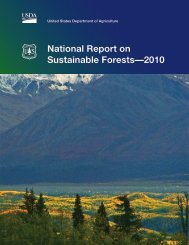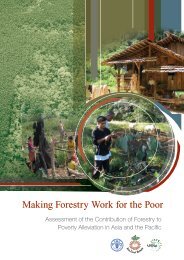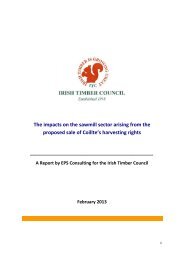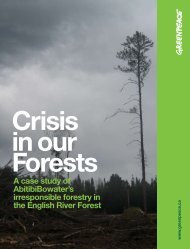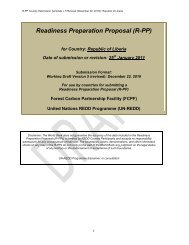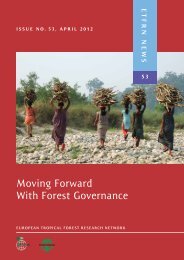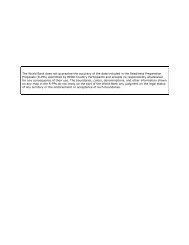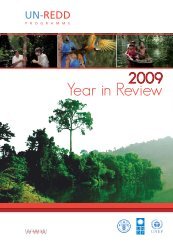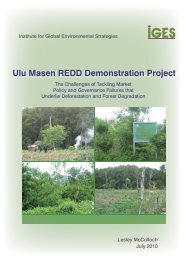pdf 1242 KByte - JIKO
pdf 1242 KByte - JIKO
pdf 1242 KByte - JIKO
You also want an ePaper? Increase the reach of your titles
YUMPU automatically turns print PDFs into web optimized ePapers that Google loves.
Policy Paper: Assessing prerequisites for market-based REDD+ activities 31<br />
REDD+ and a good institutional framework for MRV are both particularly important for ensuring<br />
the effectiveness and efficiency of REDD+.<br />
3. With REDD+ aiming at inducing changes in the conventional way of using forests, clearly defined<br />
forest tenure structures represent another prerequisite for the implementation of REDD+ activities,<br />
which are also pivotal for ensuring rights of forest dependent people are being respected.<br />
4. With tenure in most developing countries not being fully formalised, establishing such a structure<br />
represents a challenging task, whose complexity is further increased with the assignment of carbon<br />
rights at the subnational level.<br />
5. Overseeing of biodiversity and social safeguards as well as the establishing of national standards represents<br />
another series of tasks with crucial importance for the implementation of REDD+ activities.<br />
In establishing national principles, procedures and standards, REDD+ countries could be informed<br />
by concepts developed within and outside of the UNFCCC. More broadly, REDD+ countries will<br />
have to thoroughly follow the progress at the UN-level while at the same time advancing in the establishing<br />
of their own concepts for monitoring safeguards under close participation of civil society.<br />
Policy readiness has been identified as a third set of prerequisites that complements the technical, institutional<br />
and legal readiness of REDD+ countries and has relevance for all four LEEE-principles. Governments<br />
need to develop a thorough understanding of the process of deforestation and forest degradation, be able to<br />
identify its manifold causes and identify those policy instruments best suiting their national situation. Furthermore,<br />
a system on how revenues are allocated has to be established, depending on the type of REDD+<br />
activities the governments intends to implement. Irrespective of the funding architecture chosen, countries<br />
would further need to ensure benefits are channelled to those directly affected by REDD+ activities.<br />
Analysing provisions for REDD+ in existing emissions trading systems<br />
The readiness elements identified guided our subsequent analysis of three carbon trading schemes: the<br />
European Union’s ETS, the newly established Cap and Trade Programme in California and the offsetting<br />
scheme foreseen in the Waxman-Markey bill. The analysis revealed very different positions regarding the<br />
use of forestry credits generally and the potential of these schemes as markets for REDD+ credits in particular.<br />
While the EU maintains a very critical stance towards forestry credits and excludes REDD+ credits from<br />
its ETS, both American schemes allow or would have allowed the use of REDD+ credits for compliance.<br />
Regulations are, however, not entirely defined yet. While documents of both schemes address several of the<br />
readiness elements identified in our study, these are not elaborated in more detail and the Waxman-Markey<br />
bill remains at a mere general level while California is still in the process of defining concrete regulations.<br />
Experiences of REDD+ pilot schemes<br />
REDD+ countries face, however, significant difficulties in fulfilling the above-mentioned requirements, as<br />
our analysis of existing readiness initiatives suggests. Capacity gaps concerning elements of all three readiness<br />
building blocks were identified. Regarding technical readiness, requirements for establishing robust<br />
reference levels and providing reliable MRV are still exceeding current capacities and data availability in<br />
most REDD+ countries. However, different options for closing these gaps are currently being explored and<br />
the experiences with community monitoring as well as technical advances in remote sensing point towards<br />
Nicolas Kreibich, Christof Arens and Wolfgang Sterk<br />
Wuppertal Institute




